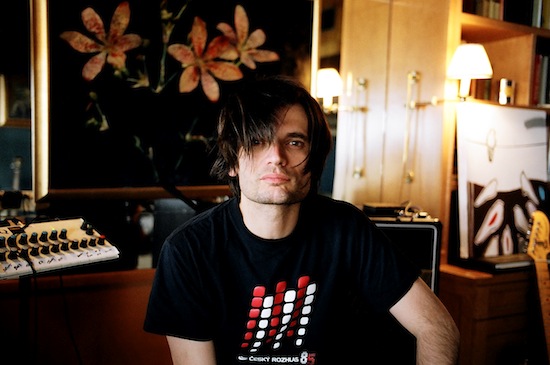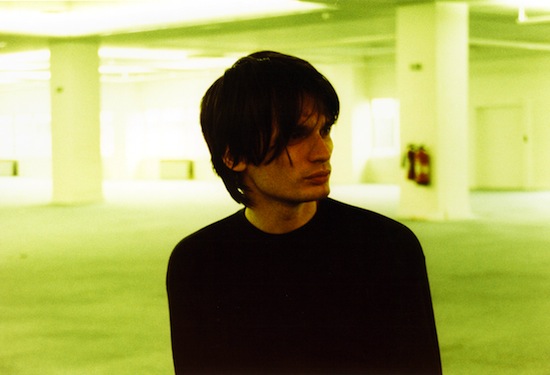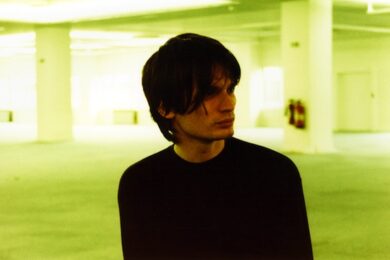On February 23, Radiohead’s Jonny Greenwood will take to Wapping Hydraulic Power Station; an incredible brick building, still housing its old machinery, that was until very recently the home of the Wapping Project arts centre. Alongside the London Contemporary Orchestra (LCO) Soloists, Greenwood will perform new works and excerpts from his film scores alongside compositions by J.S. Bach, Henry Purcell and the British composer Edmund Finnis.
The concert is a testament to his involvement in the classical tradition and further signals that Greenwood is a respected and popular composer in his own right – so it’s tempting to position his solo compositions as a departure from his involvement in Radiohead’s music.
But Greenwood’s contributions to Radiohead, recently and in the past, paint a more complex picture. There’s a hint of Krzysztof Penderecki in the choral keyboards of Ok Computer’s ‘Exit Music For A Film’, while the composer’s influence is more clearly heard in ‘Climbing Up The Walls’. At the same time, the brass arrangements for ‘The National Anthem’ and ‘Life In A Glasshouse’ suggest that Greenwood has a long held interest in, and talent for, more ambitious-than-your-average-band arrangements; and there’s his frequent use of the peculiar ondes Martenot, popularised by the composer Olivier Messiaen, which provides the incredible emotional pull on tracks like Hail To The Thief’s ‘Where I End And You Begin’ and Kid A’s ‘How To Disappear Completely’. We can also look back to the Ether Festival in 2005, when Thom Yorke joined Jonny Greenwood and the Nazareth Orchestra on stage, performing a new Radiohead song called ‘Arpeggi’.
It was unlike anything the band had yet released – but you can recognise it as the first iteration of ‘Weird Fishes/Apreggi’, from 2007’s In Rainbows. Where at Ether, strings rise and fall behind Thom Yorke’s vocals, the album replaces instruments with the voice of band guitarist Ed O’Brien; and while the central melodic progression is near identical on both versions, In Rainbows foregrounds guitars, burying the ondes Martenot which characterised the performance at the Ether Festival.
The dampening of that particular instrument is telling, because its relationship with Radiohead, and the bridge it builds between them and the composer Olivier Messiaen, is a neat symbol for Jonny Greenwood’s musical output. He confesses a long-held love for Messaien’s music and for the instrument, featuring it in his earliest solo compositions – ‘Smear’, ‘Piano For Children’ and ‘Popcorn Superhet Receiver’ in 2004 and 2005 – and on his scores for film, most prominently Paul Thomas Anderson’s acclaimed There Will Be Blood, which brought Greenwood’s solo compositions to a wider audience.
Greenwood has since scored the film adaptation of Haruki Murakami’s book Norwegian Wood, and We Need To Talk About Kevin, adapted from Lionel’s Shriver’s novel of the same name. In 2012, he worked with Paul Thomas Anderson again, scoring The Master, and is due to work on Anderson’s next movie, Inherent Vice.
As you would expect from such a talented man, Greenwood’s eloquence and clarity of thought shine through when he discusses his musical progression and his own influences. What makes that fact all the more extraordinary is that he seems reluctant to take credit for anything. Perhaps that’s what defines his unique talent.
Your compositions will sound brilliant in a space like the Wapping Hydraulic Power Station. How important is setting to performance and how does a film’s setting shape what you write?
Jonny Greenwood: Thanks! I hope so. I don’t really know yet if that’s true – which is what’s so interesting about live concerts. I’ve seen the LCO play in a number of non-standard venues around London – in a disused underground station, on top of Primrose Hill – and I loved the experience of seeing an orchestra like that. Something about being free from seat numbers, and venues with a big ‘V’, brings you closer to these remarkable players. Also quite nice to have a bar in the same room, of course.
I’m writing music just for this performance at the moment. Usually I’d be aiming at a recording session for a film, and it’s good to be focussed instead on a single occasion. At the moment I’m trying to prepare a few short pieces, and we’ll do whatever sounds good in the space on the day.
It’s funny, I trust microphones, speakers and recordings less and less, and no longer buy into the idea that I can recreate at home, or in my earphones, the experience of hearing live acoustic instruments. The orchestra is already a set of speakers that react differently to each player, each room and each concert – it’s that high level of uncertainly and unrepeatability that I like.
The music is just soaked into the walls of a room straight from the instruments – and it’s a one-off deal. The alternative – left speaker, right speaker – is kind of a compromise. Plus, things can go wrong in a performance. I quite enjoy that tension. Easy to say that two weeks before.
How does writing for a particular performance alter your writing process?
JG: I’m preparing some microtonal things for the LCO to play – but waiting to see how they sound when we get to the venue. This is what we do with Radiohead too – big cavernous halls lend themselves to different kinds of songs, and it’ll be refreshing to have the same luxury at a classical concert. Usually, the programs for those are set in stone months ahead of time. I suspect the room will be too reverberant for microtones, which need quite precise acoustics when there are only seven players – but better for the slower sextets from the Norwegian Wood soundtrack – and perhaps some ondes Martenot music.

You’ve certainly developed a particular style as a composer. Can you describe your development, as you see it?
JG: I’ve slowly got more confident about writing for orchestral players. Some of the microtonal stuff I’ve done has been really enjoyable to do – but then, there’s lots of romantic little pieces too, especially in Norwegian Wood. Even There Will Be Blood had a proportion of quite conventional string music. Strangely, it can be a disadvantage to be a semi-semi-competent string player when you’re writing for them. I still tend to underestimate what real players can do. I’m always dragging them down to my level… [it] makes my stuff easier to play, at least.
It would seem to me that Norwegian Wood and The Master, while not being period compositions, perhaps take account of each film’s respective periods more so than, say, There Will Be Blood?
JG: I’m usually keen to keep the technology right for the period of the film. Maybe I cheated a little with the ondes Martenot in There Will Be Blood – though early ones did exist in the 1920’s, as any Martenot bore will tell you. I over-obsess about this stuff, really. In Norwegian Wood I hunted out a 60s Japanese nylon string guitar and some period home recording equipment, and recorded a bunch of solo guitar things that were meant to have been written and recorded by Reiko, the piano teacher. I imagined finding the tapes years later, and wondered what they’d sound like.
It’s very pretentious – no mention of this happening in the film or book – but was a big help in writing the music, because I could ask – how would a classical pianist learn to play in isolation, and what would she write? Other times it’s about finding the right instrument. With We Need To Talk About Kevin it was the wire-strung harp, and all these cold chords and blank music.
There’s a strong influence from Ligeti, Messiaen and Penderecki in your work, and you’ve drawn explicit references to Penderecki, writing 48 Responses To Polymorphia. Can you describe how you consider the distinction between influence and reference in those cases?
JG: I love hearing Penderecki played by live orchestras – there’s nothing like it. Far stranger that the recordings prepare you for. But Messiaen was my first connection to classical music. He was still alive when I was 15, and for whatever reason I felt I could equate him with my other favourite bands – there was no big posthumous reputation to put me off. So I’m still very fond of writing things in the same modes of limited transposition that he used. Indeed, am using them in a couple of the new pieces.
What about the influence of pop and rock on classical music? Steve Reich produced his own responses to Radiohead in 2012, with Radio Rewrite.
JG: Composers are influenced by all the important music in their lives – and I suppose that since radio started playing popular music, that’s as likely to be The Beatles or Aphex Twin as it is to be Verdi or Ravel. They’d be strange teenagers if they didn’t. But cross-pollinating happens too – Aphex Twin did more interesting things with electronic music than most trained composers, who seemed to approach samplers with undue caution and reverence in those early days
Can you explain your interest in modes of limited transposition?
JG: I started using these modes in the music for the film Bodysong, partly as a way to tie lots of disparate styles of music together – the jazz musicians could improvise using them, the laptop could be restricted to these notes— and so it just helped create some continuity. Always nice to have a set of limits or rules to work against too.
You’ve been working on compositions, in various forms, for around ten years now. What was happening, during that time, which led to you to the musical path you’ve taken?
JG: It’s hearing classical players that spurs me on, really. I think I’ll always feel a little in awe whenever I see someone in their 20s or 30s carrying a cello or violin case – because I know, if they’re doing it professionally, how many years of practice have gone into being able to make music with them. And the sounds they can make just hit me very hard, and feel full of limitless complexity. It’s a fine line, of course, and I change my mind all the time about the merits of technical ability. Nothing is more off-putting than over-played, or over-written music. But at the same time, I’m wary of the ‘noble savage’ idea that one chord songs are more real or heartfelt. Lots of the Velvet Underground songs are harmonically very complicated – likewise Buzzcocks – but they’re so well written that it’s not obvious.
When it is obvious, I guess you’re tipped into prog rock, and everyone just feels unwell….
It’s tempting to suggest that you’ve moved from being a respected rock guitarist to a respected composer but is that too simplistic? I’m thinking, for example, of your scoring on ‘The National Anthem’, ‘Life in a Glasshouse’ or ‘How to Disappear Completely’, and your use of the ondes Martenot across several Radiohead tracks. Do you feel that your solo work is different from your work with Radiohead?
JG: I’ve always relied on feedback and guidance from the band for those. Indeed, ‘The National Anthem’ arrangement was sung by Thom – I just wrote it down. I’m not sure what they make of the orchestral stuff. I think they’re very proud of me getting the stuff played. And some of the good ideas filter back into the band: I wouldn’t have done the arrangement to ‘Harry Patch (In Memory Of)’ without my time away from them writing orchestral stuff – and that’s my favourite string arrangement.
I’m always happiest trying new instruments – and honestly enjoy playing, say, the glockenspiel with Radiohead as much as I do the guitar. I think regular touring has forced me to play the guitar more than anything else, which is why I’m probably most confident playing that. And whist I’d be lost if I couldn’t play it too, I dislike the totemic worship of the thing… magazines, collectors, and so on. I enjoy struggling with instruments I can’t really play.
Has your work as a composer changed your approach with Radiohead? I was at the Ether Festival when you performed ‘Arpeggi’ as an orchestral arrangement, long before the release of In Rainbows – where ‘Arpeggi’ was recorded with a conventional band arrangement.
JG: I’m still keen to approach a Radiohead song by going to orchestra first instead of orchestra last, as is traditional. We did it with ‘Harry Patch’, which is just Thom and a string orchestra – and I think we should do more.
Do you discuss your film work with anybody in Radiohead?
JG: No, I don’t really discuss it. It’s quite solitary work – lots of preparation on paper, then a frightening few hours recording the result with your fingers crossed and everyone’s eyes on the clock. Having said that, I did The Master soundtrack with the LCO – and that was a good deal calmer and more enjoyable that a typical orchestral session.
Are you a workaholic? You’ve said that, for certain Radiohead arrangements, you’ve relied on the band for feedback; and that you’re driven, in composition, by those playing your music. I get the sense that you might need to feel as if you’re doing something for somebody, to spur you on.
JG: I’m quite lazy – fear and deadlines motivate me a lot. So does having someone to write music for. When I wrote for the BBC concert orchestra I had a list of the players on the wall in front of my desk, ostensibly to remind me of the layout of the orchestra – but having these names really helped me. It’s the reason I wrote ‘Popcorn Superhet Receiver’ for 32 separate players instead of an anonymous group of first or second violins.
Do you have certain ambitions as a composer? Do you have ideas for where you might like to see your work in ten years time, for example, just as it’s developed along certain lines in the last ten years or so?
JG: Just to keep getting access to these players and more time sat in listening when they play. It’s very addictive once you start.
Information and tickets for Jonny Greenwood and LCO Soloists here



